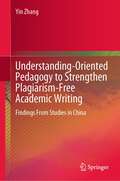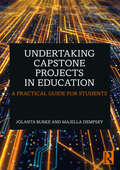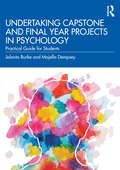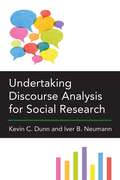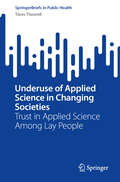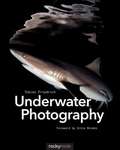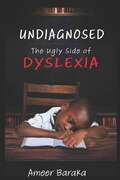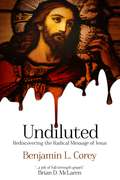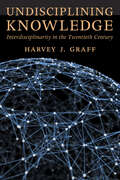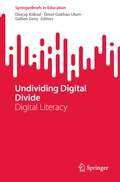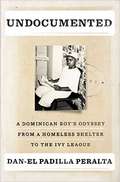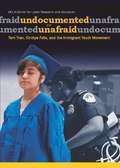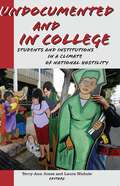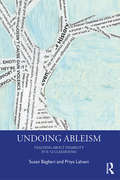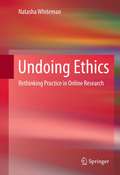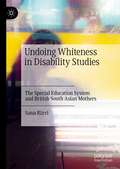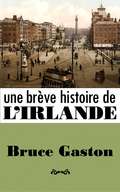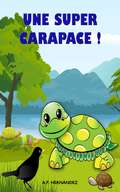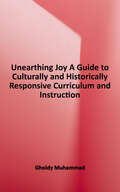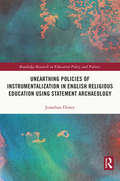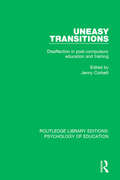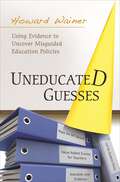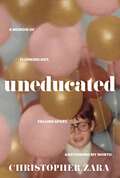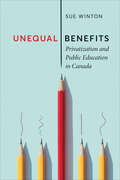- Table View
- List View
Understanding-Oriented Pedagogy to Strengthen Plagiarism-Free Academic Writing: Findings From Studies in China
by Yin ZhangThis book discusses the plagiarism-free academic writing in higher education. It demonstrates how to orchestrate an understanding-oriented pedagogy (including the teaching of plagiarism and source use) in order to facilitate plagiarism-free academic writing among undergraduates by revealing studies in China. This book emphasizes that plagiarism is a mere symptom of educational problems and plagiarism urgently needs education-based solutions instead of punish solutions. It highlights that students' meaningful understandings of plagiarism and source use should be identified as the main learning objectives of plagiarism instruction, as well as features the adoption of plagiarism instruction in academic writing practices in subject courses. It also focuses on the potentials of Information and Communication Technology (ICT) in scaffolding learning and teaching under plagiarism pedagogy beyond merely detecting plagiarism. This book also contributes to the discussion about the validity of current plagiarism assessment scales by providing evidences to challenge them and proposing a new one. This book is of great benefits for readers to increase knowledge and promote positive attitudes toward plagiarism and plagiarism instruction. It adds to our knowledge of how plagiarism in higher education can be effectively prevented by adopting an understanding-oriented pedagogy. It also adds to our knowledge of how Chinese undergraduates and their instructors view plagiarism and cope with plagiarism in discipline-based courses, which provides robust evidence for the academic debate about whether culture has effects on students’ plagiarism in academic writing. Finally, it provides insights about the relationship among plagiarism, pedagogy, and technology.
Undertaking Capstone Projects in Education: A Practical Guide for Students
by Jolanta Burke Majella DempseyUndertaking Capstone Projects in Education provides students with all of the information required to successfully design and complete a capstone project. Guiding the reader in a step-by-step process, this book covers how to create a question, select a topic of interest, and apply the best possible design solutions. Structured in a way that will help readers build their skills, chapters explore all aspects of the capstone project from the inception of the idea, to laying the foundations, designing the project, analysing the data, and presenting the findings. Filled with examples and written in a friendly and collaborative style, this key guide uses simple language and easy-to-understand examples to unpack complex research issues. This book is essential reading for students and anyone interested in undertaking a capstone project in the field of education.
Undertaking Capstone and Final Year Projects in Psychology: Practical Guide for Students
by Jolanta Burke Majella DempseyUndertaking Capstone and Final Year Projects in Psychology serves a seminal purpose in guiding its readers to create a capstone project. The text employs traditional and emerging methodologies and methods in order to posit an exhaustive approach that the psychology students can adopt to see their project to fruition. The text aims at fortifying the reader’s skills through the structure of its chapters as they begin to work on their capstone or final year project. The chapters collectively explore the varied aspects that are involved in the completion of a final year project, that is, beginning from the inception of the idea to laying the foundation, designing the project, analysing the data, and, finally, presenting the findings. The text guides the reader through each step and provides further guidance on approaching the idea, coming up with the research question, positioning it within the epistemological and ontological context, and constructing the theoretical framework to arrive at the optimal design solutions. The text will be useful for psychology students who are currently completing a capstone or a final year project. It is further aimed at psychology students who will subsequently be working on a project and are looking forward to gaining cognisance regarding the approach and the methodology to be adopted for the same.
Undertaking Discourse Analysis for Social Research
by Iver B. Neumann Kevin C. DunnKevin C. Dunn and Iver B. Neumann offer a concise, accessible introduction to discourse analysis in the social sciences. A vital resource for students and scholars alike, Undertaking Discourse Analysis for Social Research combines a theoretical and conceptual review with a "how-to" guide for using the method. In the first part of the book, the authors discuss the development of discourse analysis as a research method and identify the main theoretical elements and epistemological assumptions that have led to its emergence as one of the primary qualitative methods of analysis in contemporary scholarship. Then, drawing from a wide-range of examples of social science scholarship, Dunn and Neumann provide an indispensable guide to the variety of ways discourse analysis has been used. They delve into what is gained by using this approach and demonstrate how one actually applies it. They cover such important issues as research prerequisites, how one conceives of a research question, what "counts" as evidence, how one "reads" the data, and some common obstacles and pitfalls. The result is a clear and accessible manual for successfully implementing discourse analysis in social research.
Underuse of Applied Science in Changing Societies: Trust in Applied Science Among Lay People (SpringerBriefs in Public Health)
by Töres TheorellThis book discusses the fact that applied science is underused in modern societies. The problem is discussed both from external points of view (trust among lay people, attitudes among politicians) and from the inside (recruitment of researchers, research education, violations of scientific rules, financial processes). The book concludes with suggested solutions. Democracy is threatened in many countries in the free world. The same is true of applied science. It could be argued that in a world situation in which increasing numbers of people distrust politicians, applied science would be the sector people should turn to for advice. However, this seems to occur to a decreasing extent. Increasing numbers of results are produced by applied scientists and these results often diverge. In that situation, laymen tend to select the research results that confirm their own ideas. In such a situation one could ask whether it is meaningful to have applied science and to allocate money to it. There are threats to applied science coming from external sources, with politicians and higher administration increasingly disregarding applied science, but also from the inside. Researchers reporting results dishonestly or in exaggerated ways and researchers who avoid results that do not confirm their own hypotheses are eroding the trust in applied science. This book, which uses Sweden, a small European country with old and strong democratic and scientific traditions, as an empirical example, puts all the external and internal problems surrounding applied science in one context. Among the topics covered: Introduction, why do people not listen? Production and producers Research students How does applied science operate? Communication with society Examples of situations in which applied science should have been used more Solutions Conclusions Underuse of Applied Science in Changing Societies: Trust in Applied Science Among Lay People is an essential resource for researchers, research students, and research teachers in psychosomatic medicine, psychiatry, behavioral medicine, social medicine, psychology, sociology, social work, nursing, and public health. Societal actors also would find the book a useful resource for their work.
Underwater Photography
by Tobias FriedrichUnderwater photography is a fascinating pursuit for those who aspire to capture the magical world found within our oceans and bring it to the surface. In this book, award-winning photographer Tobias Friedrich teaches us how to create stunning underwater images, covering everything from the equipment needed, to creating powerful compositions, to processing the final image. He uses case studies to show how his own images were created, and provides detailed explanations for specific techniques that can be applied to your very next dive.The text is supported by images from some of the most beautiful diving areas on Earth. Also included are countless tips and tricks for the beginner and intermediate photographer.Topics include:Choosing the right equipmentComposing your imagesWide-angle photographyMacro photographyImage editingCase studiesDiagrams of shooting positionsAn added bonus is the 22-page Guest Gallery featuring images by some of today's most recognized names in underwater photography, including Ernie Brooks, Alex Mustard, Richard Salas, Imran Ahmad, and Eric Cheng.The abundance of breathtaking underwater images contained in this book is sure to inspire you to plan your next dive.Foreword by Ernie Brooks.
Undiagnosed: The Ugly Side of Dyslexia
by Ameer BarakaIn UNDIAGNOSED, The Ugly Side of Dyslexia, Emmy nominated actor Ameer Baraka depicts how coming of age in the murderous streets of 1980s New Orleans collided with an unrecognized learning difference. Incarcerated for manslaughter at the age of fourteen, Ameer must reconcile his past with the will to persevere through the misconception that he's unable to learn. At age twenty-three, Ameer re-enters the prison system, where he reclaims an education denied to so many who struggle to read. His rage transforms into determination to help other inmates and young people recognize that through perseverance and education, there is an alternative to living a life of crime and a method to dismantle the school-to-prison pipeline. Stories speak louder than statistics, and in this tale of redemption, the good we do is measured by what we've overcome and the lives we inspire after discovering our truth. Ameer Baraka is an award-winning and Daytime Emmy Nominated Actor, author, dyslexia advocate, youth mentor, and prison coach. Born to humble beginnings in New Orleans, Ameer's early life was as gloomy and as ill-fated as a young life could have been. In and out of the prison system as a kid for transgressions ranging from youthful indiscretions to major crimes, he was seemingly on a one-way trip to oblivion. Almost illiterate when he went to prison, he was diagnosed with dyslexia and learned to read in his mid-twenties while behind bars. Seeing how education and ability to read have changed his life, Ameer is dedicated to inspiring young people with his message that they, too, can overcome meager beginnings and obstacles in their way to eventually triumph through hard work, dedication, strong faith, and the pursuit of education.
Undiluted: Rediscovering The Radical Message Of Jesus
by Benjamin L. CoreyAre you ready to begin experiencing an undiluted Jesus? Benjamin Corey confronts our vision of Jesus head-on, asking the hard question: Is what we see and hear in the modern church all there is to the message of Jesus... or is there a more radical side to Jesus than we have been led to believe? Get ready to encounter a Jesus that is determined to turn over the tables of a stale, ineffective and boring gospel that seeks to escape from the world instead of transforming it. This radical Jesus and His message. . . Invites us to reorient our lives not on Christian religion, but on the person of Jesus Calls us to live out faith in the context of authentic community with others, instead of isolation Includes the excluded and invites the outcast to have a seat at the table Responds to enemies with a radical, unexplainable love Undiluted will invite you to step out of your comfort zone and into a process of rediscovering the radical, counter cultural, and life-changing message of Jesus. As you do, you'll discover a more vibrant faith as you embrace an undiluted Jesus and His radical message!
Undisciplining Knowledge: Interdisciplinarity in the Twentieth Century
by Harvey J. GraffThe first critical history of interdisciplinary efforts and movements in the modern university.Interdisciplinarity—or the interrelationships among distinct fields, disciplines, or branches of knowledge in pursuit of new answers to pressing problems—is one of the most contested topics in higher education today. Some see it as a way to break down the silos of academic departments and foster creative interchange, while others view it as a destructive force that will diminish academic quality and destroy the university as we know it. In Undisciplining Knowledge, acclaimed scholar Harvey J. Graff presents readers with the first comparative and critical history of interdisciplinary initiatives in the modern university. Arranged chronologically, the book tells the engaging story of how various academic fields both embraced and fought off efforts to share knowledge with other scholars. It is a story of myths, exaggerations, and misunderstandings, on all sides.Touching on a wide variety of disciplines—including genetic biology, sociology, the humanities, communications, social relations, operations research, cognitive science, materials science, nanotechnology, cultural studies, literacy studies, and biosciences—the book examines the ideals, theories, and practices of interdisciplinarity through comparative case studies. Graff interweaves this narrative with a social, institutional, and intellectual history of interdisciplinary efforts over the 140 years of the modern university, focusing on both its implementation and evolution while exploring substantial differences in definitions, goals, institutional locations, and modes of organization across different areas of focus.Scholars across the disciplines, specialists in higher education, administrators, and interested readers will find the book’s multiple perspectives and practical advice on building and operating—and avoiding fallacies and errors—in interdisciplinary research and education invaluable.
Undividing Digital Divide: Digital Literacy (SpringerBriefs in Education)
by Ömer Gökhan Ulum Dinçay Köksal Gülten GençThis book problematizes digital divide with critical lens by focusing on education in general and specifically second language education with an emphasis on the context of Turkey based on sound methodologies and robust theories of modernity, postmodernity, post-structuralism and post-method framework. In line with this conceptualization, critical thinking skills, social dialogue, collaboration, accessibility and digital literacy have been widely discussed empirically and prioritized in this book. In addition, social injustice, digital inequality, gender gap, economic disparity, demographic differences and knowledge divide have also been addressed. EFL teachers and pre-service teachers as cultural workers have been incorporated into the studies to critically reflect upon digital divide in Turkey. The views of teachers and learners at a socio-economic disadvantage emanating from socio-political issues have been addressed and foregrounded. The digital divide and inequalities that COVID-19 pandemic has produced have also been emphasized. The context of Turkey where digital divide has been prevalent during COVID-19 pandemic is believed to inspire researchers specializing in digitalization and digital education. The strategies, problems, effects and solutions have been presented. This book presents a reliable source to students, teachers and academics in education and second language education as well as social scientists and policy-makers across the globe.
Undocumented
by Dan-el Padilla PeraltaAn undocumented immigrant's journey from a New York City homeless shelter to the top of his Princeton class, Dan-el Padilla Peralta has lived the American dream. As a boy, he came here legally with his family. Together they left Santo Domingo behind, but life in New York City was harder than they imagined. Their visas lapsed, and Dan-el's father returned home. But Dan-el's courageous mother was determined to make a better life for her bright sons.Without papers, she faced tremendous obstacles. While Dan-el was only in grade school, the family joined the ranks of the city's homeless. Dan-el, his mother, and brother lived in a downtown shelter where Dan-el's only refuge was the meager library. There he met Jeff, a young volunteer from a wealthy family. Jeff was immediately struck by Dan-el's passion for books and learning. With Jeff's help, Dan-el was accepted on scholarship to Collegiate, the oldest private school in the country.There, Dan-el thrived. Throughout his youth, Dan-el navigated these two worlds: the rough streets of East Harlem, where he lived with his brother and his mother and tried to make friends, and the ultra-elite halls of a Manhattan private school, where he could immerse himself in a world of books and where he soon rose to the top of his class.From Collegiate, Dan-el went to Princeton, where he thrived, and where he made the momentous decision to come out as an undocumented student in a Wall Street Journal profile a few months before he gave the salutatorian's traditional address in Latin at his commencement.Undocumented is a classic story of the triumph of the human spirit. It also is the perfect cri de coeur for the debate on comprehensive immigration reform. <br> <b>Winner of the 2016 Alex Award (10 best adult books that appeal to teen audiences)</b>
Undocumented And Unafraid: Tam Tran, Cinthya Felix, And The Immigrant Youth Movement
by Victor Narro Kent Wong Janna Shadduck-Hernandez Fabiola Inzunza Julie Monroe Abel ValenzuelaA tribute to two immigrant students Tam Tran and Cinthya Felix as it presents a research on the experiences of undocumented youth and the misperceptions people have of them as they work towards a socialyl just society built on the foundation of "equal opportunity for all".
Undocumented and in College: Students and Institutions in a Climate of National Hostility
by Terry-Ann Jones and Laura Nichols, EditorsThe current daily experiences of undocumented students as they navigate the processes of entering and then thriving in Jesuit colleges are explored alongside an investigation of the knowledge and attitudes among staff and faculty about undocumented students in their midst, and the institutional response to their presence. Cutting across the fields of U.S. immigration policy, theory and history, religion, law, and education, Undocumented and in College delineates the historical and present-day contexts of immigration, including the role of religious institutions. This unique volume, based on an extensive two-year study (2010–12) of undocumented students at Jesuit colleges in the United States and with contributions from various scholars working within these institutions, incorporates survey research and in-depth interviews to present the perspectives of students, staff, and the institutions.
Undocumented: A Dominican Boy's Odyssey from a Homeless Shelter to the Ivy League
by Dan-el Padilla PeraltaAn undocumented immigrant's journey from a New York City homeless shelter to the top of his Princeton classDan-el Padilla Peralta has lived the American dream. As a boy, he came here legally with his family. Together they left Santo Domingo behind, but life in New York City was harder than they imagined. Their visas lapsed, and Dan-el's father returned home. But Dan-el's courageous mother was determined to make a better life for her bright sons.Without papers, she faced tremendous obstacles. While Dan-el was only in grade school, the family joined the ranks of the city's homeless. Dan-el, his mother, and brother lived in a downtown shelter where Dan-el's only refuge was the meager library. There he met Jeff, a young volunteer from a wealthy family. Jeff was immediately struck by Dan-el's passion for books and learning. With Jeff's help, Dan-el was accepted on scholarship to Collegiate, the oldest private school in the country.There, Dan-el thrived. Throughout his youth, Dan-el navigated these two worlds: the rough streets of East Harlem, where he lived with his brother and his mother and tried to make friends, and the ultra-elite halls of a Manhattan private school, where he could immerse himself in a world of books and where he soon rose to the top of his class.From Collegiate, Dan-el went to Princeton, where he thrived, and where he made the momentous decision to come out as an undocumented student in a Wall Street Journal profile a few months before he gave the salutatorian's traditional address in Latin at his commencement.Undocumented is a classic story of the triumph of the human spirit. It also is the perfect cri de coeur for the debate on comprehensive immigration reform.Praise for Undocumented"Dan-el Padilla Peralta's story is as compulsively readable as a novel, an all-American tall tale that just happens to be true. From homeless shelter to Princeton, Oxford, and Stanford, through the grace not only of his own hard work but his mother's discipline and care, he documents the America we should still aspire to be." --Dr. Anne-Marie Slaughter, President of the New America Foundation
Undoing Ableism: Teaching About Disability in K-12 Classrooms
by Susan Baglieri Priya LalvaniUndoing Ableism is a sourcebook for teaching about disability and anti-ableism in K–12 classrooms. Conceptually grounded in disability studies, critical pedagogy, and social justice education, this book provides both a rationale as well as strategies for broad-based inquiries that allow students to examine social and cultural foundations of oppression, learn to disrupt ableism, and position themselves as agents of social change. Using an interactive style, the book provides tools teachers can use to facilitate authentic dialogues with students about constructed meanings of disability, the nature of belongingness, and the creation of inclusive communities.
Undoing Ethics
by Natasha WhitemanOver the past decade, researchers from different academic disciplines have paid increasing attention to the productivity of online environments. The ethical underpinnings of research in such settings, however, remain contested and often controversial. As traditional debates have been reignited by the need to respond to the particular characteristics of technologically-mediated environments, researchers have entered anew key debates regarding the moral, legal and regulative aspects of research ethics. A growing trend in this work has been towards the promotion of localized and contextualized research ethics - the suggestion that the decisions we make should be informed by the nature of the environments we study and the habits/expectations of participants within them. Despite such moves, the relationship between the empirical, theoretical and methodological aspects of Internet research ethics remains underexplored. Drawing from ongoing sociological research into the practices of media cultures online, this book provides a timely and distinctive response to this need. This book explores the relationship between the production of ethical stances in two different contexts: the ethical manoeuvring of participants within online media-fan communities and the ethical decision-making of the author as Internet researcher, manoeuvring, as it were, in the academic community. In doing so, the book outlines a reflexive framework for exploring research ethics at different levels of analysis; the empirical settings of research; the theoretical perspectives which inform the researcher's objectification of the research settings; and the methodological issues and practical decisions that constitute the activity as research. The analysis of these different levels develops a way of thinking about ethical practice in terms of stabilizing and destabilizing moves within and between research and researched communities. The analysis emphasizes the continuities and discontinuities between both research practice and online media-fan activity, and social activity in on and offline environments.
Undoing Whiteness in Disability Studies: The Special Education System and British South Asian Mothers
by Sana RizviThis book offers a nuanced way to conceptualise South Asian Muslim families’ experiences of disability within the UK. The book adopts an intersectional lens to engage with personal narratives on mothering disabled children, negotiating home-school relationships, and developing familiarity with the complex special education system. The author calls for a re-envisioning of special education and disability studies literature from its currently overwhelmingly White middle-class discourse, to one that espouses multi-ethnic and multi-faith perspectives. The book positions minoritised mothers at the forefront of the home-school relationship, who navigate the UK special education system amidst intersecting social inequalities. The author proposes that schools and both formal and informal institutions reformulate their roles in facilitating true inclusion for minoritised disabled families at an epistemic and systemic level.
Une Brève Histoire de l'Irlande
by Anne-Sophie Leluan-Pinker Bruce GastonHistoire abrégée de l’Irlande des temps anciens jusqu’au 21eme siècle, Une Brève Histoire de l’Irlande se destine à tous ceux qui souhaitent une rapide vue d’ensemble sur ce sujet ou qui souhaitent combler des lacunes dans leurs connaissances. Concis mais complet, ce livre peut se lire en deux fois: idéal si vous avez besoin d’un résumé des événements principaux et n’avez ni le temps ni l’énergie de parcourir des ouvrages universitaires! Découvrez en un rien de temps ce que furent l’Irlande médiévale, la Guerre Jacobite du dix-septième siècle et les années florissantes du Tigre Celte. Une Brève Histoire de l’Irlande contient aussi de courtes notices biographiques sur les principaux acteurs de l’histoire de l'Irlande, une chronologie détaillée de la période celte jusqu’à 2012, et des suggestions de lectures complémentaires. Liste des chapitres: • L’Irlande celte •L’Invasion Normande de l’Irlande •La Réforme et les Plantations •Le Dix-Septième Siècle •Le Dix-Huitième Siècle •Le Dix-Neuvième Siècle •De l’Insurrection de Pâques à la Guerre d’Indépendance •Le Traité et la Partition •La Guerre Civile •L’Etat Libre •L’Urgence •L’Irlande après l’Urgence •Les Années Soixante et Soixante-Dix •La Récession •Le Tigre Celte •La Crise Economique
Une super carapace !
by A. P. HernándezGertrude est une tortue très spéciale. Dans sa carapace, elle a tout ce qu'ele désire : un jacuzzi, un réfrigérateur rempli de glaces, un fauteuil et même une télévision. Gertrude se sent si bien dans sa carapace qu'elle met très peu la tête dehors. Mais un beau jour... Sa vie change à jamais.
Unearthing Joy: A Guide to Culturally and Historically Responsive Curriculum and Instruction
by Gholdy MuhammadIn this follow-up to Cultivating Genius, Dr. Gholdy Muhammad adds a fifth pursuit joy to her groundbreaking instructional model. She defines joy as more than celebration and happiness, but also as wellness, beauty, healing, and justice for oneself and across humanity. She shows how teaching from cultural and historical realities can enhance our efforts to cultivate identity, skills, intellect, criticality, and indeed joy for all students, giving them a powerful purpose to learn and contribute to the world. Dr. Muhammad's wise implementation advice is paired with model lessons and assessment tools that span subjects and grade levels.
Unearthing Policies of Instrumentalization in English Religious Education Using Statement Archaeology (Routledge Research in Education Policy and Politics)
by Jonathan DoneyThis book presents the theoretical basis and practical steps involved in using Statement Archaeology, an innovative method that enhances understandings of policy development, exemplifying its use in relation to one curriculum subject, Religious Education. The book is the first of its kind to fully describe the theoretical foundations of Statement Archaeology and the practical steps in its deployment, acting as a methodological handbook that will enable readers to use the method subsequently in their own research. Further, the book offers an unparalleled contribution to the historical account of the development and maintenance of compulsory RE in English state-maintained schools and uses this to engage with key current debates in Religious Education policy. It unearths important insights into how the present is built, informs future policy direction and potential implementation strategies, and helps prevent the repetition of unsuccessful past endeavours. This book will be of great interest for academics, researchers and post-graduate students in the fields of religious education, educational policy and politics, and research methods in education.
Uneasy Transitions: Disaffection in Post-Compulsory Education and Training (Routledge Library Editions: Psychology of Education)
by Jenny CorbettOriginally published in 1990, this title offers a range of perspectives from practitioners, administrators and researchers, examining personal experiences of disaffection in students and staff within the context of national political, social, and economic change. The transitions include moves into employment, training of continued education. Expressions of unease and disquiet are set clearly within the political context of marginalized status for minority groups, highlighting issues relating to disability, gender, class and race, in which the process of transition has been impeded through discriminating practices. The book includes reflections from practitioners, offering coping strategies and flexible approaches, and responses from administrators indicating their awareness of the need to support practitioners during the process of change.
Uneducated Guesses: Using Evidence to Uncover Misguided Education Policies
by Howard WainerWhat statistical evidence shows us about our misguided educational policiesUneducated Guesses challenges everything our policymakers thought they knew about education and education reform, from how to close the achievement gap in public schools to admission standards for top universities. In this explosive book, Howard Wainer uses statistical evidence to show why some of the most widely held beliefs in education today—and the policies that have resulted—are wrong. He shows why colleges that make the SAT optional for applicants end up with underperforming students and inflated national rankings, and why the push to substitute achievement tests for aptitude tests makes no sense. Wainer challenges the thinking behind the enormous rise of advanced placement courses in high schools, and demonstrates why assessing teachers based on how well their students perform on tests—a central pillar of recent education reforms—is woefully misguided. He explains why college rankings are often lacking in hard evidence, why essay questions on tests disadvantage women, why the most grievous errors in education testing are not made by testing organizations—and much more.No one concerned about seeing our children achieve their full potential can afford to ignore this book. With forceful storytelling, wry insight, and a wealth of real-world examples, Uneducated Guesses exposes today's educational policies to the light of empirical evidence, and offers solutions for fairer and more viable future policies.
Uneducated: A Memoir of Flunking Out, Falling Apart, and Finding My Worth
by Christopher ZaraIn this &“hilarious and heartbreaking...must-read memoir&” (Publishers Weekly), Christopher Zara breaks down his winding journey from dropout to journalist and the impact that his background had in the world of privilege. Boldly honest, wryly funny, and utterly open-hearted, Uneducated is one diploma-less journalist&’s map of our growing educational divide and, ultimately, a challenge: in our credential-obsessed world, what is the true value of a college degree? For Christopher Zara, this is the professional minefield he has had to navigate since the day he was kicked out of his New Jersey high school for behavioral problems and never allowed back. From a school for &“troubled kids,&” to wrestling with his identity in the burgeoning punk scene of the 1980s; from a stint as an ice cream scooper as he got clean in Florida, to an unpaid internship in New York in his thirties, Zara spent years contending with skeptical hiring managers and his own impostor syndrome before breaking into the world of journalism—only to be met by an industry preoccupied with pedigree. As he navigated the world of the elite and saw the realities of the education gap firsthand, Zara realized he needed to confront the label he had been quietly holding in: what it looked like to be part of the &“working class&”—whatever that meant.Book Riot's Eight New Nonfiction Books to Read in May Book Browse's Best Books of May 2023
Unequal Benefits: Privatization and Public Education in Canada (UTP Insights)
by Sue WintonDrawing on research from across Canada and beyond, education policy expert Sue Winton critically analyzes policies encouraging the privatization of public education in Canada. These policies, including school choice, fundraising, fees, and international education, encourages parents and others in the private sector to take on responsibilities for education formerly provided by governments with devastating consequences for the democratic goals of public education. Unequal Benefits introduces traditional and critical approaches to policy research and explains how to conduct a critical policy analysis. Winton explains the role policy plays in supporting and challenging inequality in the pursuit of a strong democracy and the public school ideal. In these idealized education spaces, policy decisions prioritize collective needs over private interests, which are made in public by democratically elected officials, and, more importantly, every child is able to access high quality education programs and enjoy their benefits at no cost. Written for parents, educators, policymakers, and other interested citizens, Unequal Benefits sheds light on how to participate in efforts to resist educational privatization and achieve the public school ideal across Canada.
